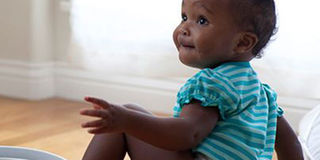When children get ‘adult’ infections

What you need to know:
- Children especially toddlers are prone to infections due to different reasons as our writer, Sarah Aanyu discovered.
Esther Ahereza, a mother to a three year old baby girl, says she had noticed that her daughter itched her private parts relentlessly. Thinking she was picking up odd behaviour from the neighbourhood, Ahereza would simply rebuke her.
She even instructed the house help, who spent most of her time with the baby, to make sure that whenever she tries to touch sthe part, she stops the baby. This, however, did not deter the little girl as she kept itching.
Out of frustration, she decided to have a critical look at the baby’s private parts only to notice whitish discharge. Fearing the worst, Ahereza rushed her daughter to hospital for further checkup only to be told that her daughter has candida.
Children sometimes develop an abnormal discharge which causes them discomfort. For most parents, such diseases are only for “adults” which is not the case. Dr Joseph Wangisi as Clinix Hospital says children can suffer from gonorrhea and candida as well as urinary tract infections.
Wangisi says such infections need to be treated fast because children’s immunity is not as strong as that of adults.
For Ahereza, it was recommended that she separates the child’s basin from the rest and to ensure that the baby is bathed at least twice a day.
What to look out for
Dr Wangisi says there are different symptoms for the infections that can alter a child’s normal discharge.
“You cannot tell whether it is candida by simply looking because there are very many illnesses that have similar symptoms,” he says.
He says for gonorrhea the discharge is yellowish or pale and non-itchy while candida is whitish and itchy. Trichomoniasis is deep yellow almost greenish in colour and it causes itching, brings blisters and foul smell.
Trichomaniasis is usually passed on to a child at birth or when it is still in the mother’s womb.
Candida is a yeast infection, while gonococcal infections can be spread when infected parents share things with their children.
Treatment
For candida, children are usually given anti-fungal treatment such as Nystatin which is in form of oral suspension and pessaries.
For gonococcal infections, Dr Wangisi says broad spectrum antibiotics are given either as tablets or injections.
Causes
If the immunity of the child is compromised due to other existing illnesses such as cancer, HIV/Aids, they are susceptible to opportunistic infections.
Dr Wangisi says prolonged usage of antibiotics can affect children’s immunity. “The body has good and bad bacteria so when antibiotics are administered for a long time, the antibiotics will kill both the good and bad bacteria which will cause a breeding ground for infections.”
Candida is normally on the skin which exist as a micro -organism but the problem comes when their numbers increase and accumulates, causing infection.
He adds, “when you recycle the baby’s clothes and underwear, the sweat will accumulate and favour the growth of the bacteria which will cause infection.” Children who wear diapers for long periods are prone to such attacks.
Dr Wangisi points out sharing toilets, basins, towels, knickers with infected persons as aggravating lifestyles.
Children who poke objects in their private parts are at a higher risk and those who play in places that are unhygienic are the ones who commonly suffer from the candida and related infections.
If untreated…
Dr Wangisi cautions against self-medication and points out that infections can cause wounds which can turn septic
“If the infections are not treated, the child can become infertile in the long run,” he adds.
In extreme cases, infections can lead to death.
What to do
Dr Wangisi makes the following suggestions;
•Regular changing of diapers and panties for babies.
•Panties should be washed and hang under the sunlight because the sun has ultra violet rays that kill the organisms.
•Iron children’s clothes to kill bacteria.
•Bathe the child regularly and make sure the treatment is administered as recommended by the doctor.
•Give the child fruits which are high in ascorbic acids to help treat inflammation.




